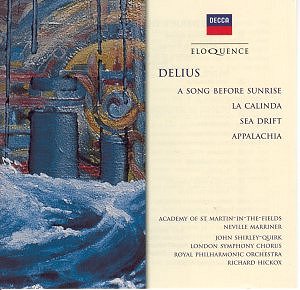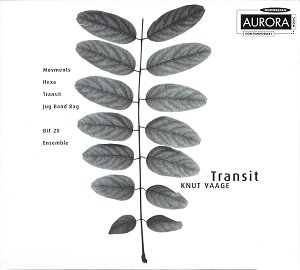 Composer: Frederick Delius
Composer: Frederick Delius
Works: Sea Drift, Appalachia, A Song Before Sunrise, La Calinda from the opera Koanga
Performers: John Shirley-Quirk (baritone), London Symphony Chorus, Royal Philharmonic Orchestra, Richard Hickox, Academy of St Martin in the Fields, Neville Marriner
Recording: 1977, 1981, ADD DDD
Label: Decca
Frederick Delius, a figure oftentimes overshadowed by his contemporaries, has been a beloved yet niche presence in the world of classical music. His works, steeped in the lushness of the English landscape and infused with the languorous spirit of Impressionism, encapsulate a unique sound world that feels both introspective and expansive. The present disc offers a commendable survey of Delius’s oeuvre, featuring two major choral-orchestral works alongside two shorter pieces that reveal the breadth of his melodic and harmonic language.
The performances led by Richard Hickox and Neville Marriner exhibit two distinct interpretations of Delius’s style. Hickox, known for his affinity with British repertoire, brings a keen dramatic sensibility to “Sea Drift”. Here, the London Symphony Chorus delivers a mist-laden choral tone that complements John Shirley-Quirk’s baritone, whose voice grows increasingly impassioned as the work unfolds. The treatment of Whitman’s text is significant; the ethereal quality of the chorus allows for moments of powerful contrast, though it occasionally obscures the clarity of the words. The choir’s soft, enveloping presence creates a soundscape that mirrors the hazy imagery of the poem, while Shirley-Quirk’s rich timbre emerges with greater clarity in the latter sections, showcasing a gradual evolution of emotional engagement.
Marriner’s approach to the shorter works, particularly “A Song Before Sunrise” and “La Calinda”, deviates from the languid interpretations often associated with Delius. His brisk tempo in “A Song Before Sunrise” captures a sense of urgency and vitality, evoking the first stirrings of life at dawn. The assertiveness of the orchestration under Marriner’s baton brings a refreshing vigor that contrasts sharply with more indulgent interpretations. The cuckoo calls, which punctuate the texture at 2:02, are rendered with delightful precision, enlivening the orchestral palette. Similarly, “La Calinda” benefits from Marriner’s lightness of touch, where the tambourine’s presence is both magical and elusive, creating a dance-like quality that shimmers without becoming overly dense.
The recording quality, produced by Decca, is robust, capturing the spaciousness of the orchestral sound with impressive clarity. The dynamic range is particularly effective, allowing the listener to appreciate the subtleties of Delius’s orchestration. The engineering successfully conveys the grandeur of the two major works while maintaining intimacy in the shorter pieces. However, the absence of detailed recording locations and session dates might leave some listeners desiring a more thorough archival context.
Comparatively, while Hickox’s “Sea Drift” does not quite reach the interpretive heights of Barbirolli or Mackerras, it offers a unique perspective that highlights the work’s dramatic qualities. In contrast, Marriner’s readings introduce a refreshing energy that rekindles the listener’s interest in Delius’s more delicate, yet vibrant, sketches. The full texts are provided, which is a boon for those wishing to engage deeply with the poetry that underpins these compositions.
This disc stands as an excellent introduction to Delius’s music, particularly for those who may have previously overlooked his contributions. Hickox and Marriner, each in their element, reveal different facets of Delius’s artistry. The interplay of choral and orchestral forces, combined with the evocative texts, creates an experience that is at once meditative and spirited, ensuring that Delius’s voice remains a vital part of the classical canon. The overall presentation, enriched by Palmer’s notes, offers listeners a well-rounded exploration of this often underappreciated composer.



